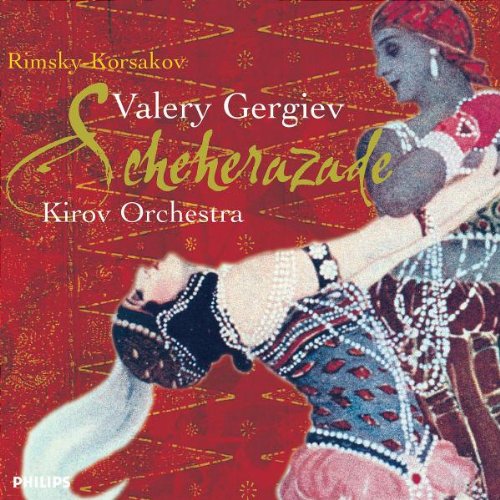Rimsky-Korsakov Scheherazade
Edge-of-the-seat playing in a weighty, powerful Scheherazade from St Petersburg
View record and artist detailsRecord and Artist Details
Composer or Director: Nikolay Rimsky-Korsakov, Alexander Borodin, Mily Alexeyevich Balakirev
Genre:
Orchestral
Label: Philips Classics
Magazine Review Date: 11/2002
Media Format: CD or Download
Media Runtime: 63
Mastering:
Stereo
DDD
Catalogue Number: 470 840-2PH

Tracks:
| Composition | Artist Credit |
|---|---|
| Scheherazade |
Nikolay Rimsky-Korsakov, Composer
Kirov Orchestra of the Mariinsky Theatre Nikolay Rimsky-Korsakov, Composer Valery Gergiev, Conductor, Bass |
| Islamey |
Mily Alexeyevich Balakirev, Composer
Kirov Orchestra of the Mariinsky Theatre Mily Alexeyevich Balakirev, Composer Valery Gergiev, Conductor, Bass |
| In the Steppes of Central Asia |
Alexander Borodin, Composer
Alexander Borodin, Composer Kirov Orchestra of the Mariinsky Theatre Valery Gergiev, Conductor, Bass |
Author: Edward Greenfield
Recorded under live conditions but without an audience in St Petersburg’s Mariinsky Theatre, this Scheherazade is the most red-blooded, exciting account of Rimsky-Korsakov’s orchestral warhorse that I know, helped by full, immediate sound of a richness rare in Russian recordings. It is a measure of Gergiev’s success that even in direct comparison with the three classic recordings I have listed, as well as the fine Jansons version, Gergiev conveys an electricity of even higher voltage.
Reiner has long provided a benchmark account, but the extra thrust of the new performance hits even harder, culminating in the final climax of the fourth movement, where the fortissimo return of the motto theme on trombones is even more overwhelming, with the extra thrust virtually impossible to achieve under ordinary studio conditions (6'49" into track 4).
The magnetism is established from the start, with Gergiev completely dispelling the feeling that this is a work which keeps stopping and starting too often for its own good. Consistently you register that these are players who have the music in their blood, with rubato naturally inflected. In expressive freedom Gergiev is often less extreme than Reiner or Karajan, as in the quasi recitando bassoon solo near the start of the second movement or the espressivo oboe solo which follows, in which Gergiev notes also the a tempo marking, keeping it steady.
The virtuosity of the St Petersburg soloists is also a ready match for even that of the Chicago Symphony Orchestra in its heyday, whether woodwind, brass or strings, with an edge-of-seat tension conveyed, particularly when Gergiev opts for challengingly fast speeds in the climactic passages of the second and fourth movements.
This is a work which Rimsky-Korsakov wrote over only a few weeks, and far more than usual this is a performance that, defying the many changes of tempo, conveys that urgency of inspiration. Yet Gergiev brings out points of detail in the brilliant instrumentation normally bypassed, as in the upward glissando for the cellos in the opening section of the third movement (3'41" into track 3), either ignored or merely hinted at by others.
There remain two points that might be counted controversial. Gergiev’s tempo for that opening section of the third movement, ‘The Young Prince and Princess’, is markedly slower than with the others, less delicate than with Beecham, and with Gergiev following Karajan in bringing out the resonance of violin tone rather than the dynamic marking of piano. Yet in context Gergiev conjures extra contrast with the other movements.
The other controversial point is that though the recorded sound has spectacular weight and power over the widest range, it is clear that reverberation has been added to a recording made in a relatively dry theatre acoustic. Happily, it does not get in the way of orchestral detail. It is more obtrusive in the two attractive fill-ups – Lyapunov’s arrangement of Balakirev’s piano showpiece sounds almost like an extra movement of Scheherazade. Both performance and recording, whatever the acoustic juggling, have a power that pins you back in your seat, making this a demonstration disc in every way.
Discover the world's largest classical music catalogue with Presto Music.

Gramophone Digital Club
- Digital Edition
- Digital Archive
- Reviews Database
- Full website access
From £8.75 / month
Subscribe
Gramophone Full Club
- Print Edition
- Digital Edition
- Digital Archive
- Reviews Database
- Full website access
From £11.00 / month
Subscribe
If you are a library, university or other organisation that would be interested in an institutional subscription to Gramophone please click here for further information.




